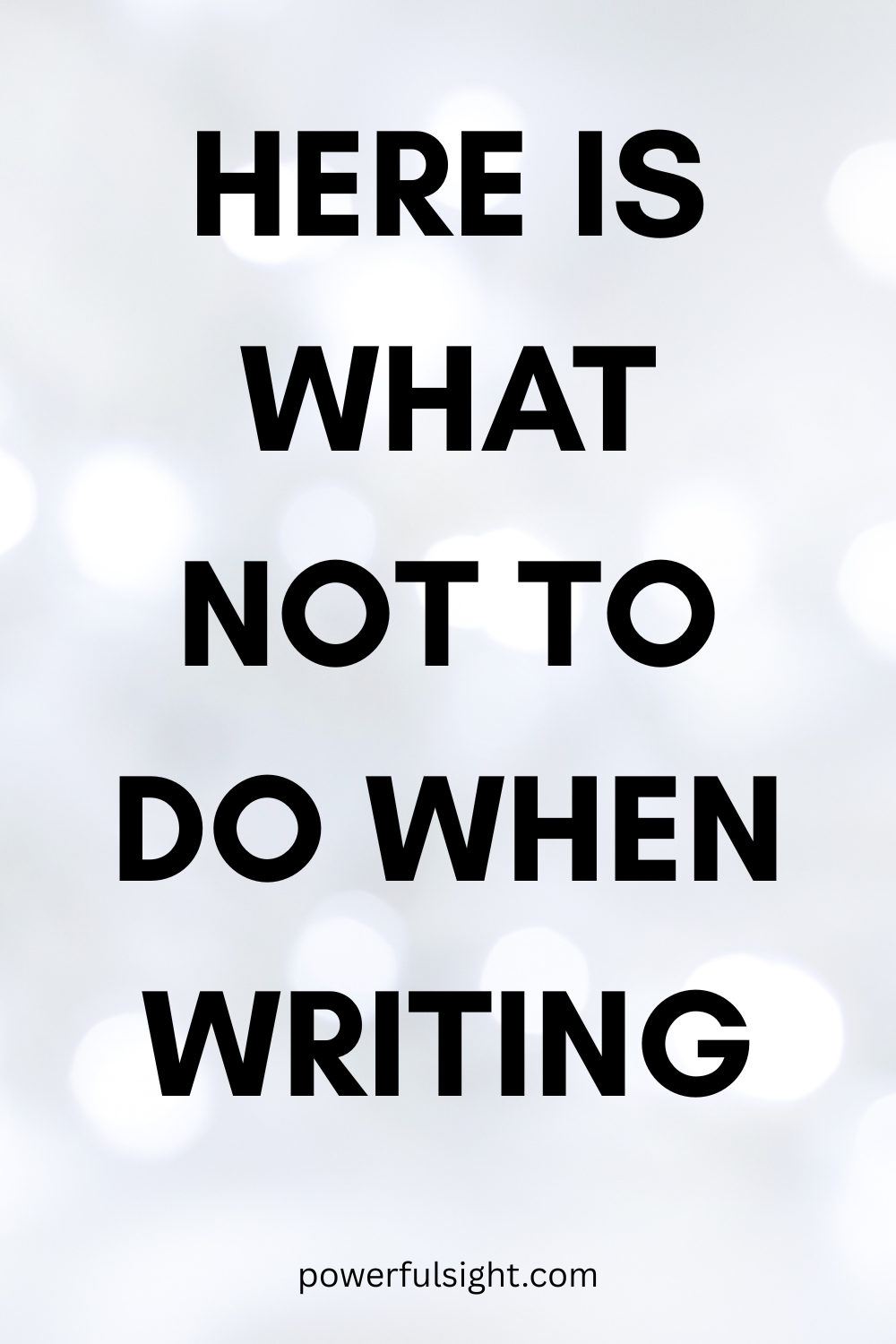We write nearly every day, whether we’re composing an email to our boss, working on a school essay, or writing a novel for fun.
We all struggle with different aspects of writing at one time or another, and it can be challenging to get words onto the page, even when we have ideas, inspiration, or motivation.
However, the most significant hurdles we encounter as writers are often not caused by a lack of any of the above. Instead, they can arise from more common mistakes that can easily trip us up.
While these mistakes range from grammatical to structural, they can all detract from your writing’s effectiveness and even its readability. By keeping an eye out for these common errors, you’ll be able to communicate clearly, effectively, and with more confidence than ever before.

What Not to Do When Writing
1. Passive Voice
Passive voice occurs when the subject of a sentence is acted upon rather than performing the action. For example, “The ball was thrown by Sarah” is in passive voice, while “Sarah threw the ball” is in active voice.
Passive voice is not always incorrect or something to be avoided at all costs. It can be necessary at times, especially in scientific or formal writing. However, it can also be overused in situations where it makes writing sound weak or vague. Passive voice tends to make writing longer and less direct, which can make it more difficult for readers to understand.
How to Avoid It:
Try to use active voice whenever possible, as it makes for more direct and engaging writing. For example, instead of writing “The ball was thrown by Sarah,” try “Sarah threw the ball.” It’s easier to understand and more concise.
Related: How To Study One Night Before The Exam
2. Complicated Words/Jargon
A common mistake when writing is using overly complex words or industry jargon when you don’t need to. You might be tempted to do this to sound more intelligent or professional, but it often has the opposite effect. While jargon is fine in moderation and sometimes necessary to communicate complex concepts, using it too often or in the wrong context can alienate your readers.
How to Avoid It:
Try to keep your writing simple and accessible. Use words that are easy to understand without being overly simplistic or losing meaning. A good rule of thumb is to write as you would speak to someone in a face-to-face conversation. Your audience will appreciate it, and your writing will be easier to understand. If there’s a simpler way to say something, use it. It’s more important for your readers to understand your message than to be impressed by your vocabulary.
Related: 100 Things To Do In January 2026
3. Wordiness
Wordiness is another common mistake many writers make. This usually happens when the writer feels the need to explain something in excruciating detail, resulting in long, convoluted sentences that leave the reader more confused than when they started. While it’s sometimes necessary to include details to back up your points, being too wordy can make your writing less effective and even turn readers off.
How to Avoid It:
Be concise in your writing and avoid using more words than necessary. Every sentence you include in your writing should serve a purpose, so ask yourself if the information is needed or if it could be expressed more concisely. For example, instead of writing, “Due to the fact that it was raining, we decided to cancel the event,” you could simply write, “We canceled the event because it was raining.”
Related: How To Improve Communication Skills
4. Lacking Structure
Structure is the foundation of any well-written piece of work. Without a clear and defined structure, your writing will likely feel disorganized and be much harder for readers to follow. This can apply to anything from essays and blog posts to novels and short stories. Having a clear beginning, middle, and end is essential to keep readers engaged and ensure your points are communicated as effectively as possible.
How to Avoid It:
Take the time to properly structure your writing before you begin. Planning out your ideas in an outline can help keep them organized and allow them to flow better. If you’re writing something longer, it’s a good idea to break your writing up into sections and subsections, each with its own heading. This makes it much easier for readers to follow. For shorter pieces, ensure each paragraph has a clear topic sentence and follows a logical progression.
Related: My Husband Has Destroyed Me Emotionally: What To Do
5. Ignoring Grammar and Punctuation Rules
Grammar and punctuation are crucial elements of effective writing. Mistakes in these areas can make your writing difficult to read and give the impression that you are either careless or unprofessional. Some of the most common errors include using the wrong punctuation, subject-verb agreement mistakes, and using sentence fragments.
How to Avoid It:
Always proofread your writing before submitting it, and take the time to read it out loud to yourself. This will help you catch any errors or awkward phrasing. There are also many grammar checker tools available, but don’t rely on them entirely as they often miss more subtle errors. If you’re unsure about a specific rule, take the time to look it up. Using proper grammar and punctuation will make your writing more polished and much easier to read.
Related: How to Know What You’re Good At
6. Repetition
Repetition is another common pitfall, especially when writing something longer. It’s easy to fall into the trap of repeating the same ideas or phrases, either because you feel the need to hammer a point home or because you’re unsure how to move on. However, repetition can make your writing feel monotonous and redundant, and it can bore your readers.
How to Avoid It:
Move on once you’ve made a point; don’t keep harping on it. If you need to reinforce something, try to do so in a different way. Use different examples, rephrase your argument, or approach the idea from a different angle. Be conscious of this when writing and check for it when you proofread.
7. Not Editing
This is one of the biggest mistakes you can make when writing. Whether you are writing a short email, a long report, or an entire novel, your first draft will almost never be perfect. Editing is where the real magic happens when it comes to writing, and if you skip this step, you’re essentially leaving your writing unfinished.
How to Avoid It:
Set aside time specifically for editing. Once you’ve finished your first draft, take a break before reviewing it. This will help you see it with fresh eyes. First, focus on fixing any obvious errors, such as spelling, punctuation, and grammar mistakes. Then, look for ways to make your writing clearer, more concise, or more engaging. Don’t be afraid to make big changes if necessary.
8. Disregarding Your Audience
Good writing is always written with the audience in mind. Whether you are writing for a business professional, a child, or a casual reader, you need to take into account what your audience will be expecting and how you can best communicate with them. If you don’t do this, your writing will feel disjointed or even irrelevant.
How to Avoid It:
Before you start writing, consider who your audience will be and what they will expect from your work. Think about their level of expertise, their interests, and what they are likely looking for. For example, a technical report for a group of engineers will need to use different language and tone than a blog post for casual readers. Tailoring your writing to your audience will make it more effective and engaging for them.
9. Telling, Not Showing
“Show, don’t tell” is one of the most useful pieces of advice for writers. Telling your readers something directly can be more efficient, but it often lacks flair and can be uninspiring. Showing is a much more engaging technique that will draw your readers in and help them experience the story or information firsthand.
How to Avoid It:
Whenever possible, show rather than tell. For example, instead of writing, “She was very sad,” try describing her actions and expressions: “She slumped in her chair, her eyes dull and unfocused.” This will allow the reader to experience the emotion themselves rather than being told what to think or feel.
10. Forgetting a Strong Opening and Conclusion
A strong opening and conclusion are just as important as the body of your writing. A weak or vague introduction will fail to capture the reader’s attention, while a lackluster conclusion can leave them feeling unsatisfied. The opening and conclusion of any piece of writing serve two crucial purposes: to engage the reader from the start and to leave them with something to remember after they’ve finished.
How to Avoid It:
Start your writing with a hook that will immediately grab the reader’s attention. This could be an interesting fact, a provocative question, or a bold statement. In your conclusion, summarize your main points and leave the reader with something to think about. A strong ending will make your writing feel complete and memorable.
Final Thoughts
Writing is a skill, and like any skill, it takes practice and attention to detail. By avoiding these ten common mistakes and focusing on clarity, simplicity, and structure, you can improve your writing and become a more effective communicator. Remember, no one’s writing is perfect on the first try, so take your time, edit thoroughly, and never stop learning. With patience and persistence, you will continue to improve as a writer.
Whether you are writing an email, a blog post, or the next great American novel, avoiding these ten common mistakes will help you produce better, more engaging, professional, and effective writing. So, keep these tips in mind and start writing with confidence today.
Save pin for later.

- 10 Signs Of A Narcissistic Grandmother - 13/01/2026
- 5 Best Self-Help Books To Read In 2026 - 12/01/2026
- 15 Activities For Toddler In 2026 - 12/01/2026
